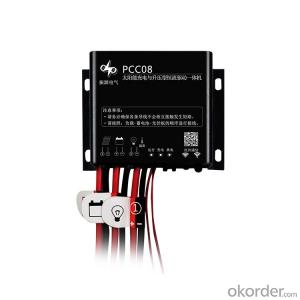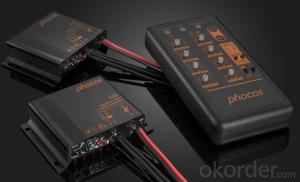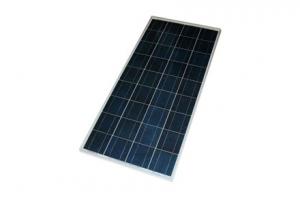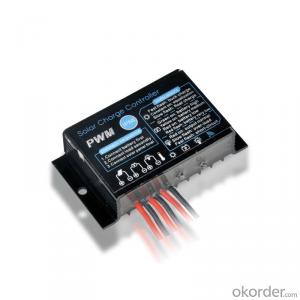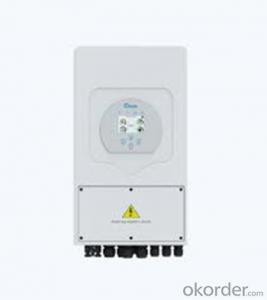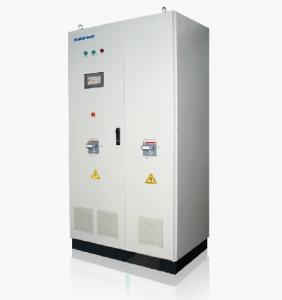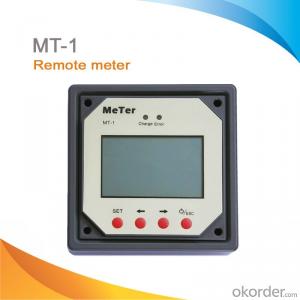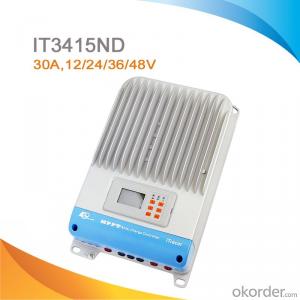IP68 PCC08 8a 12V PWM Solar Charger Controller for Solar Street light
- Loading Port:
- China main port
- Payment Terms:
- TT OR LC
- Min Order Qty:
- 1 pc
- Supply Capability:
- 1000 pc/month
OKorder Service Pledge
OKorder Financial Service
You Might Also Like
1.Features :
*Professional design to promote system reliability
-Using international well-know brand semiconductor device.
- High LED driving, significantly reduce the product temperature.
- IP68 protection degree without any buttons, further improve the waterproof reliability.
*Discharge efficiency
- LED constant current drive efficiency up to 96%
-Dimming LED constant current drive efficiency from 91%-96%
*Minimal power consumption
-The current consumption ≤10mA
*Intelligent battery management
-It is PWM and CV charge, which matches with Li protect board perfectly.
- Significantly extends the battery lifetime up to 50% base on intelligent temperature
compensation charge and discharge management.
- Intelligent energy management of battery ensures that the battery charge & discharge in
shallow state which significantly extend the battery life.
*Intelligent LED drive management
- Light control function, automatic lights LED in the dark, turn off automatically at dawn
- Constant current drive
- three times control.
- Delaying infrared body sensor
- Morning lighting
- Dimming function, control to output different power in different typical time.
*Flexible parameter set
- Excellent man-machine interface, convenient operation.
- Infrared wireless communications, connecting with a handheld remote control for easy installation.
*Protect function
- Battery and the solar panel reverse connection protection.
- To prevent the battery discharge to the solar panel .
- Battery low voltage disconnect and reconnect voltage protection.
-The LED output short and open circuit protection.
2. Technical parameter
Model | PCC08 G4 |
System voltage | 12V |
Output power | 40W/12 V |
Static power consumption | 13 mA/12 V |
Rated charging current | 8 A |
Solar panel power | ≤ 120 W |
Solar panel open-circuit voltage | < 25 V |
MPPT tracking efficiency | 96% |
Typical constant current source efficiency | 90% to 96% |
Overvoltage protection | Overcharge voltage 2 V |
Charging voltage limit | Overcharge voltage 1 V |
Current accuracy | ±3% |
Over-temperature protection | 85 °C |
Light control voltage | 16 V ~50 V |
Operating temperature | -35 °C ~+60 °C |
Protection degree | IP68 |
Weight | 180g |
Dimensions (mm) | 58*82*23.5 |
3. Images
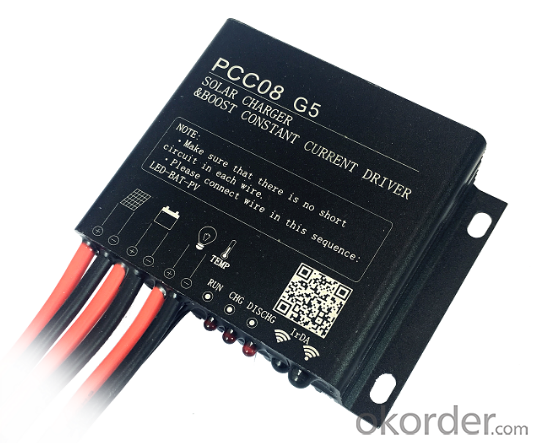
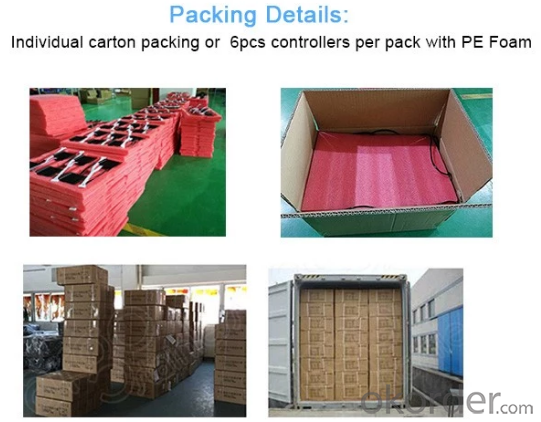
4.FAQ
Q: DO YOU HAVE ANY CERTIFICATION FOR YOUR PRODUCTS?
A: We have ISO9001:2015, CE、 RoHS certifications for all of our products.
Q: DO YOU HAVE MOQ FOR PLACE ORDER?
A: Low MOQ, 1pe for sample checking is available.
- Q:Can a solar controller handle both 12V and 24V systems?
- No, a solar controller is designed to handle either a 12V or a 24V system, but not both simultaneously.
- Q:Can a solar controller be used with solar-powered electric vehicles?
- Yes, a solar controller can be used with solar-powered electric vehicles. A solar controller regulates and controls the charge from solar panels to the batteries of the vehicle, ensuring efficient charging and preventing overcharging. This helps in maximizing the usage of solar energy and extending the battery life of the electric vehicle.
- Q:Solar controller one machine how
- 4LED display status, dual digital display mode of operation (a key operation intuitive, with power saving mode); can also be compatible with 12V system and 24V system (fully compatible) LED lamp operating current size, that is, the first period of work adjustable power ; The second time period, the third time period the power size adjustable, adjustable range of 10% -90%; the first time period, the second time period, the third time period, before dawn lights time adjustable; Tune, that is, after a few days after the delay in time to turn on the lights.
- Q:Can a solar controller be used with solar-powered telecommunications equipment?
- Yes, a solar controller can be used with solar-powered telecommunications equipment. A solar controller is responsible for regulating the voltage and managing the charging process of a solar battery system. It ensures that the solar panels are charging the batteries efficiently and protects them from overcharging or discharging. Therefore, using a solar controller is essential for maintaining the performance and longevity of solar-powered telecommunications equipment.
- Q:How do I determine the size of a solar controller for my system?
- To determine the size of a solar controller for your system, you need to consider the maximum current and voltage of your solar panels. The solar controller should be capable of handling the current and voltage outputs of your panels. Additionally, you should also consider the maximum load or power consumption of your system to ensure the controller can handle the required capacity.
- Q:Can a solar controller be used for both off-grid and grid-tied systems?
- No, a solar controller cannot be used for both off-grid and grid-tied systems. Off-grid systems require a solar controller that can manage battery charging and discharging, while grid-tied systems do not require batteries and need a different type of controller to regulate the flow of energy to and from the grid.
- Q:Can a solar controller be used in a solar-powered emergency backup system?
- Yes, a solar controller can be used in a solar-powered emergency backup system. A solar controller helps regulate the charging and discharging of batteries in a solar system, ensuring optimal performance and preventing overcharging or damage to the batteries. In an emergency backup system, a solar controller would play a crucial role in managing the power generated by the solar panels, storing it in batteries, and supplying it to essential devices or appliances when needed.
- Q:What is the maximum load wattage a solar controller can handle?
- The maximum load wattage a solar controller can handle depends on the specific model and its specifications. Generally, solar controllers are designed to handle a range of load wattages, typically from a few hundred watts to several thousand watts. It is important to refer to the manufacturer's specifications for the specific solar controller in question to determine its maximum load wattage capacity.
- Q:Can a solar controller be used in a solar-powered heating system?
- Yes, a solar controller can be used in a solar-powered heating system. A solar controller is responsible for regulating the flow of electricity from the solar panels to the heating system, ensuring efficient operation and preventing overcharging of the batteries. It helps optimize the performance of the heating system by monitoring and adjusting the energy input based on the heating requirements.
- Q:How does a PWM solar controller regulate the charging process?
- A PWM solar controller regulates the charging process by using a Pulse Width Modulation (PWM) technique to control the amount of energy being delivered from the solar panels to the battery. The controller constantly monitors the battery voltage to determine its state of charge. When the battery is low, the controller allows the maximum amount of current to flow from the solar panels to the battery. As the battery voltage increases and reaches a certain threshold, the controller starts reducing the current flow to prevent overcharging. The PWM technique works by rapidly switching the solar panel's output on and off. The duration of the on and off cycles is controlled in a way that the average voltage supplied to the battery matches its requirements. By adjusting the duty cycle of the switching, the controller regulates the charging current. During the on cycle, the solar panel delivers energy to the battery. When the battery voltage reaches the desired level, the controller switches off the current flow to the battery during the off cycle. This process is repeated continuously to maintain the battery at the optimal charging level. The advantage of using a PWM solar controller is that it provides a more efficient charging process compared to traditional controllers. It allows for a higher charging current during the initial stages when the battery is deeply discharged, ensuring a faster charging time. As the battery voltage increases, the controller gradually reduces the charging current to prevent overcharging and prolong the battery's lifespan. In summary, a PWM solar controller regulates the charging process by controlling the duration of the on and off cycles of the solar panel's output. This technique ensures that the battery is charged efficiently and prevents overcharging, maximizing the battery's performance and lifespan.
1. Manufacturer Overview |
|
|---|---|
| Location | |
| Year Established | |
| Annual Output Value | |
| Main Markets | |
| Company Certifications | |
2. Manufacturer Certificates |
|
|---|---|
| a) Certification Name | |
| Range | |
| Reference | |
| Validity Period | |
3. Manufacturer Capability |
|
|---|---|
| a)Trade Capacity | |
| Nearest Port | |
| Export Percentage | |
| No.of Employees in Trade Department | |
| Language Spoken: | |
| b)Factory Information | |
| Factory Size: | |
| No. of Production Lines | |
| Contract Manufacturing | |
| Product Price Range | |
Send your message to us
IP68 PCC08 8a 12V PWM Solar Charger Controller for Solar Street light
- Loading Port:
- China main port
- Payment Terms:
- TT OR LC
- Min Order Qty:
- 1 pc
- Supply Capability:
- 1000 pc/month
OKorder Service Pledge
OKorder Financial Service
Similar products
New products
Hot products
Hot Searches
Related keywords
